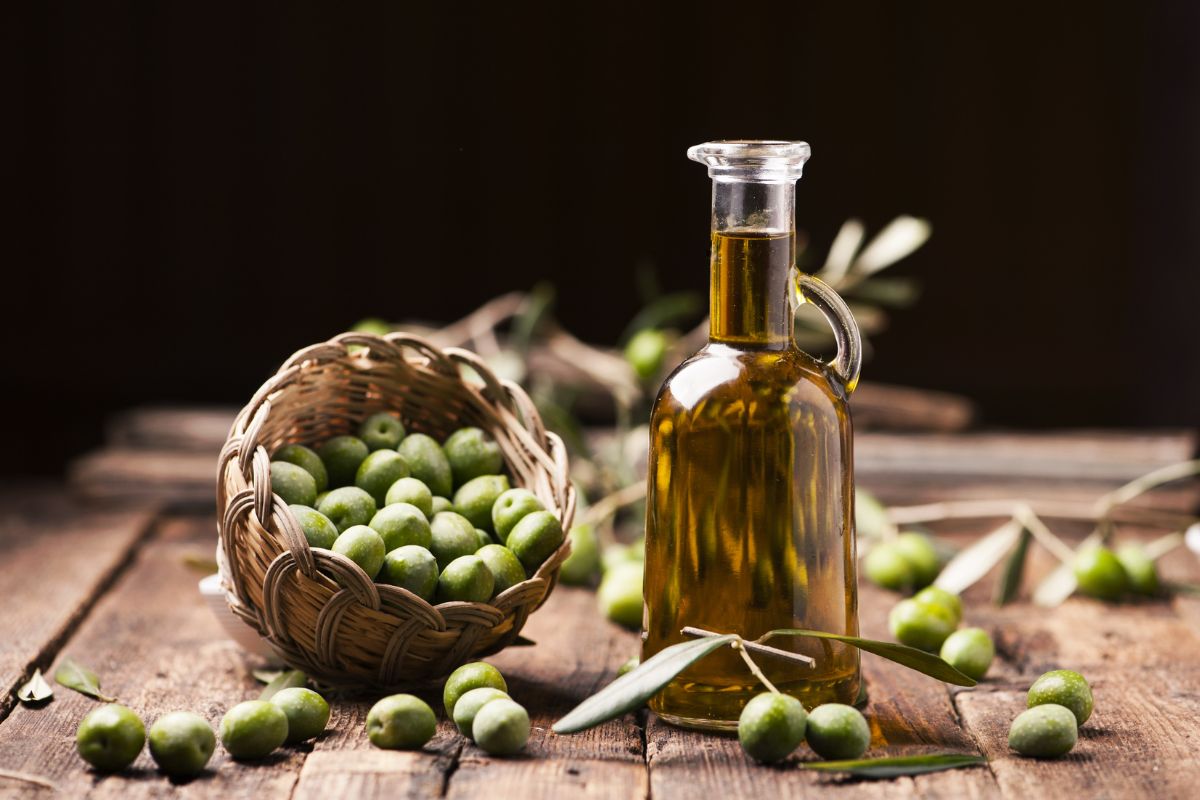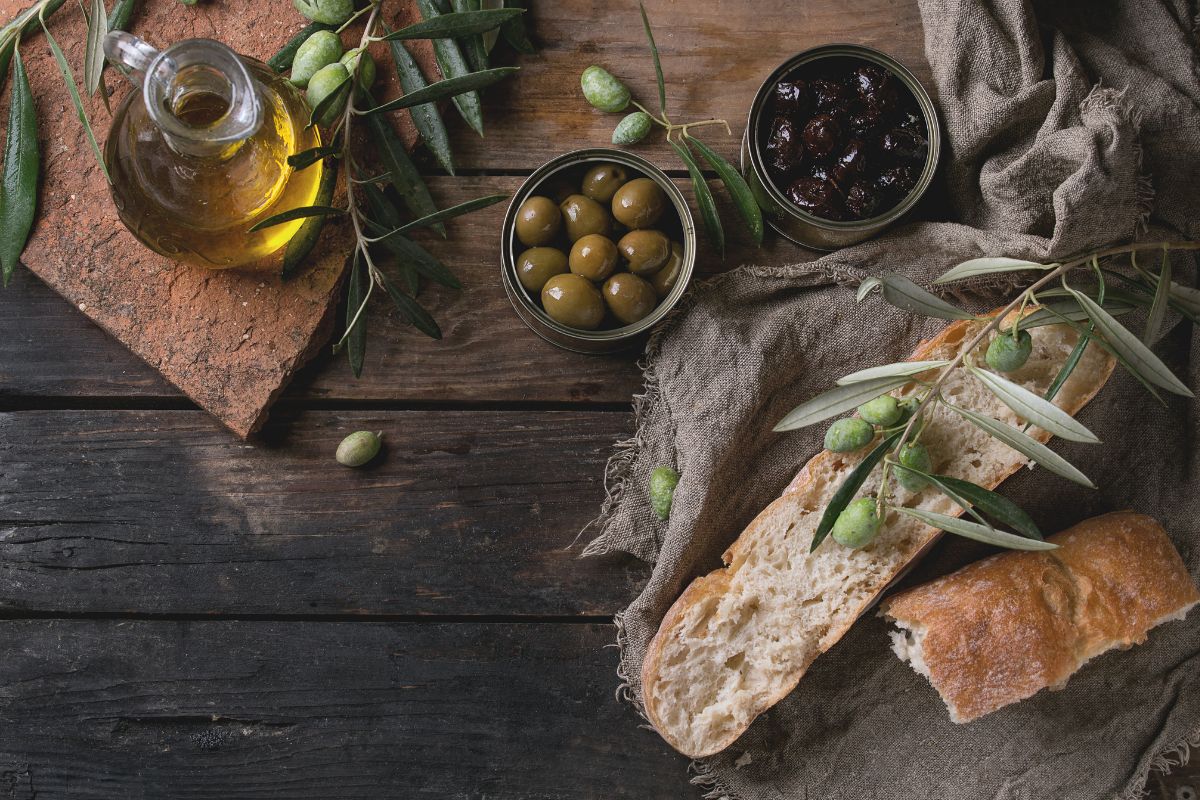Can Olive Oil Go Bad?
Olive oil is a beloved ingredient in many kitchens. How to tell if olive oil is bad is crucial to ensure you’re using fresh and safe olive oil. Its rich flavor and many health benefits make it a staple in various culinary creations. However, like some food items, olive oil can go bad over time.

How to Tell if Olive Oil Is Bad
Watch out for these signs if you want to know if your olive oil is bad:
Check the Smell
One of the easiest ways to determine if your olive oil is bad is by sniffing it. Fresh olive oil should have a pleasant, fruity aroma. If it smells rancid, musty, or off in any way, it’s a clear indication that the oil is no longer suitable.
Taste Test
Another reliable method is olive oil tasting. Quality olive oil should have a clean, slightly peppery, and mildly bitter taste. It has likely gone bad if it tastes sour, bitter, or stale. Rancid olive oil can also leave a greasy or waxy sensation in your mouth.
Inspect for Sediment
Fresh olive oil should be clear and free from any sediment or cloudiness. Nonetheless, it can develop sediment or become cloudy over time. While this doesn’t necessarily mean it’s gone off, it’s a sign that the oil might be past its prime.
Pour a small amount of olive oil into a clear glass. If you notice particles or haziness, it’s a sign of spoilage. Alternatively, you can try gently shaking the bottle; if the cloudiness persists, it may be best to replace it.
Check the Color
While the color of olive oil can vary from dark green to light yellow, depending on its type and age. It should generally be a shade of green or gold. If your olive oil turns dark brown or black, it has likely deteriorated and is no longer suitable for use.
Assess the Consistency
The texture of olive oil should be smooth and consistent. If it has become thick, gooey, or has an unusual texture, it indicates that the oil has gone off.
Examine the Bottle
Inspect the bottle or container in which you store the olive oil. If there are any signs of leakage, exposure to light, or improper sealing, it may have accelerated the oil’s deterioration.
Check the Expiration Date
While olive oil doesn’t have a strict expiration date like many other foods, it has a “best-by” date. If your olive oil is past this date, it doesn’t necessarily mean it’s off, but it may have lost some flavor and nutritional value.

How Long Does Olive Oil Last?
Understanding how long olive oil lasts, when opened and unopened, is essential to ensure its quality and safety. Let’s explore the shelf life of olive oil in different conditions.
Unopened Olive Oil
Unopened olive oil’s shelf life is longer than opened bottles. When you store it properly in a cool and dark place, unopened olive oil can last for a considerable amount of time. Here are some guidelines:
Extra Virgin Olive Oil (EVOO)
High-quality EVOO, stored in the right conditions, can last up to two years or even longer without significant degradation.
Virgin Olive Oil
Virgin olive oil, like EVOO, can last up to two years or more when unopened.
Pure Olive Oil
Pure olive oil, which has undergone some refinement, can also last up to two years or more if stored correctly.
Light Olive Oil
Light olive oil, often a blend of refined and EVOO, can have a similar shelf life of up to two years when unopened.
The key to preserving unopened olive oil is proper storage. It is best to keep it away from heat sources and direct sunlight. Ensure you tightly seal the bottle to minimize oxygen exposure.
Opened Olive Oil
Once you open a bottle of olive oil, its shelf life becomes more limited due to increased exposure to air and light. However, you can still extend its usability with proper care. Here’s what you need to know:
Extra Virgin Olive Oil (EVOO)
Once opened, EVOO is best used within six months to a year for optimal flavor and health benefits.
Virgin Olive Oil
Opened virgin olive oil can generally last up to a year if stored correctly.
Pure Olive Oil
Pure olive oil can also last up to a year when stored properly.
Light Olive Oil
Like other types, opened light olive oil is best if used within a year for the best flavor.
To make your opened olive oil last longer, follow these storage tips:
- Dark Bottle: Transfer the oil to a dark glass bottle with a tight-sealing cap. This helps protect it from light exposure.
- Cool Storage: Keep the opened bottle in a cool, dark place, such as a pantry or cupboard, to prevent temperature fluctuations.
- Tightly Seal: Ensure you tightly seal the bottle to minimize oxygen exposure after each use.
- Avoid Heat: Keep the opened olive oil away from heat sources like stoves and ovens.
Can You Use Expired Olive Oil?
It’s important to note that olive oil has no strict expiration date like perishable foods. Instead, it typically has a “best by” or “use by” date, which indicates the period during which the oil can retain its optimal flavor and quality.
If your olive oil is past its “best by” or “use by” date, it doesn’t necessarily mean it’s unsafe. However, there are some things to consider:
- Taste and flavor: Over time, expired olive oil may lose its pleasant, fruity flavor and develop off-flavors, such as bitterness or a rancid taste. This can have a significant effect on the taste of your dishes.
- Nutritional value: As olive oil ages, it may also lose some nutritional value, particularly its antioxidant content. Fresh olive oil is well known for its health benefits, so using expired oil may not provide the same advantages.
- Cooking vs. non-cooking use: If you plan to use olive oil for cooking, the impact of flavor changes may be less noticeable in dishes with strong flavors. However, using expired oil may not be ideal for uses where the oil’s taste is prominent, such as salad dressings or drizzling over vegetables.
Safety Considerations
From a safety perspective, expired olive oil is generally not harmful if stored correctly. Additionally, it doesn’t exhibit signs of spoilage, such as a stinky smell or off-putting taste.
However, it’s essential to use your judgment and consider the quality and intended use of the oil. If the oil has a strong, unpleasant odor or taste, it’s best to discard it.
What happens if you drink expired olive oil? While generally not harmful, consuming expired olive oil can have several negative consequences, primarily related to taste and nutritional value. Like other fats and oils, olive oil can deteriorate over time, leading to changes in flavor, aroma, and nutritional quality.
What to do With Expired Olive Oil
While it’s not ideal for cooking or dressing your salads, several practical and eco-friendly ways exist to use expired olive oil. Here are some creative suggestions:
Make Homemade Soap
Expired olive oil can be an excellent ingredient for making homemade soap. The oil’s natural moisturizing properties can be beneficial for your skin. Combine it with other soap-making ingredients like lye, essential oils, and herbs to create unique soaps.
Revive Wooden Furniture
Olive oil can work wonders on wooden furniture. Mix some expired olive oil with vinegar, and you’ll get an eco-friendly furniture polish. Apply it sparingly to wooden surfaces, then buff it with a soft cloth. Your furniture will shine like new, and the wood will get nourished and protected.
Condition Leather Items
Leather goods like shoes, bags, and jackets can benefit from a little TLC using expired olive oil. Apply a small amount to a cloth and gently rub it into the leather. It will help restore moisture and give your leather items a fresh look.
What Does Rancid Oil Smell Like?
Recognizing the smell of rancid oil is vital for maintaining the quality and safety of your cooking oils and other products containing fats and oils. Rancidity occurs when oils and fats undergo oxidation, leading to the breakdown of their chemical structure.
This process alters the flavor and quality and can produce unpleasant odors. Here’s what rancid oil smells like:
Rancid oil often emits a stale, musty, or “off” odor. It’s a noticeable departure from non-rancid oil’s fresh, clean scent. This odor can be subtle initially but becomes more pronounced as the oil deteriorates.
Sometimes, rancid oil can have a scent reminiscent of wet cardboard or damp paper. This odor is often associated with oils exposed to excess moisture, accelerating oxidation.

That’s All, Folks
While you can use olive oil past its “best by” date, it’s essential to consider its quality, taste, and intended use. Proper storage and timely consumption will ensure you continue enjoying fresh olive oil’s delicious flavor in your culinary creations.
When in doubt, it’s safer to replace olive oil that you suspect has gone bad, especially if you plan to use it for cooking or in recipes where its flavor is prominent. Healthy and fresh olive oil tastes better and provides the full range of potential health benefits.

Community of passionate writers and content creators who share a love for Italian heritage, culture, travel, food, and the Italian-American community. Our mission is to celebrate Italy’s rich history and traditions and connect with others who share the same passion.

